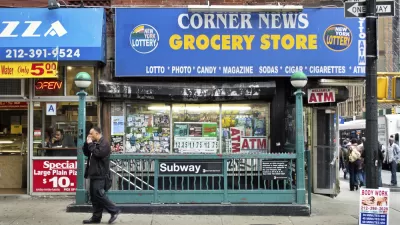A recent study claiming that transportation costs in Houston, among other expenses, raise the cost of living almost to the same level as living in New York City. Some took exception to the study's methodology.

A recently published report by the Citizens Budget Commission made news in urbanism circles for daring to publish the claim that living in Houston is almost expensive as living in New York City, due to the former's sprawling layout.
The study invoked vitriol among some online commentators (many tending toward the "market urbanism" spectrum of the urbanism debate) about the assumptions embedded in the study's methodology.
Connor Harris, writing for the Manhattan Institute, fleshes out those objections in a full-fledged attack on the Citizen Budget Commission's report. Harris argues that the study made several crucial mistakes, with more detail listed in the article for each: 1) Using metropolitan-area averages, 2) Counting taxes selectively, 3) Overlooking differences in quality, and 4) Making misleading income adjustments.
"Texas Monthly [which broadcast the study's findings] told a story that a lot of people wanted to hear: loosely regulated housing markets like Houston have long embarrassed ideological opponents of free markets who insist that only rent controls and massive public subsidies can provide affordable housing," writes Harris. "There is a ready audience for the argument that Houston’s affordability is a mirage. If you ever find an argument like this tempting, though, ask yourself: is it more likely that you’re mistaken, or that the millions of Americans voting with their feet are?"
FULL STORY: Is Houston Really Less Affordable Than New York?

Alabama: Trump Terminates Settlements for Black Communities Harmed By Raw Sewage
Trump deemed the landmark civil rights agreement “illegal DEI and environmental justice policy.”

Planetizen Federal Action Tracker
A weekly monitor of how Trump’s orders and actions are impacting planners and planning in America.

The 120 Year Old Tiny Home Villages That Sheltered San Francisco’s Earthquake Refugees
More than a century ago, San Francisco mobilized to house thousands of residents displaced by the 1906 earthquake. Could their strategy offer a model for the present?

In Both Crashes and Crime, Public Transportation is Far Safer than Driving
Contrary to popular assumptions, public transportation has far lower crash and crime rates than automobile travel. For safer communities, improve and encourage transit travel.

Report: Zoning Reforms Should Complement Nashville’s Ambitious Transit Plan
Without reform, restrictive zoning codes will limit the impact of the city’s planned transit expansion and could exclude some of the residents who depend on transit the most.

Judge Orders Release of Frozen IRA, IIJA Funding
The decision is a victory for environmental groups who charged that freezing funds for critical infrastructure and disaster response programs caused “real and irreparable harm” to communities.
Urban Design for Planners 1: Software Tools
This six-course series explores essential urban design concepts using open source software and equips planners with the tools they need to participate fully in the urban design process.
Planning for Universal Design
Learn the tools for implementing Universal Design in planning regulations.
Clanton & Associates, Inc.
Jessamine County Fiscal Court
Institute for Housing and Urban Development Studies (IHS)
City of Grandview
Harvard GSD Executive Education
Toledo-Lucas County Plan Commissions
Salt Lake City
NYU Wagner Graduate School of Public Service





























